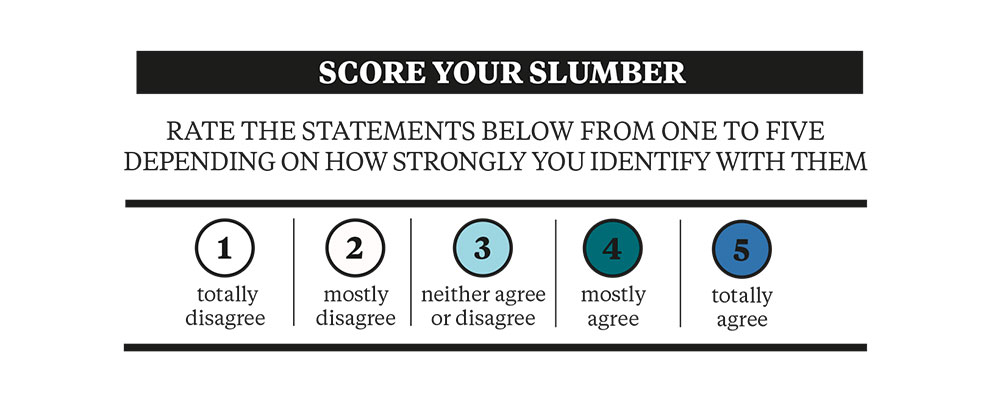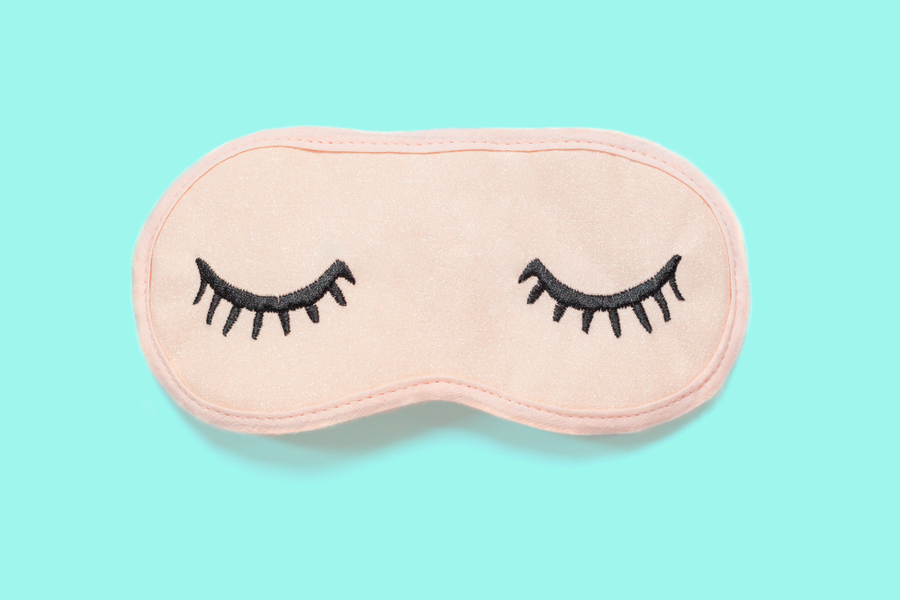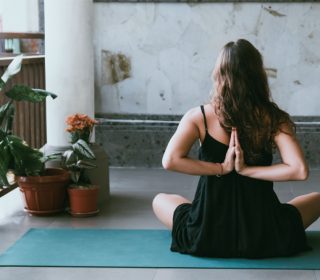Quiz: How to Improve your quality of sleep

Struggling to drift off every night? Waking up in the wee small hours riddled with anxiety? (you know, where you start panicking about having forgotten to reply to a not-at-all important email, or other such things that don’t seem like much of a deal in the cold light of day?). Wake up feeling about as fresh as if you’ve been run over by a bus? You are not alone.
SLEEP, INTERRUPTED
Stress, hormones and the little matters of a global pandemic and, now, war in Ukraine mean that many of us are struggling for a decent bit – or a lot – of shut eye. Up to 45% of adults say they have struggled with anxiety, and 35% of us say we regularly don’t get enough sleep. Studies have shown that people with insomnia are far more likely to suffer with depression and anxiety. So, in honour of World Sleep Day on Friday 18 March, we thought we’d set you a little quiz to see how you’re faring in the snooze stakes, and how you can do better.
1 I have a regular, like-clockwork bedtime routine, which involves slowly winding down and no screen time whatsoever (not even a quick text/email check).
2 Once my head hits the pillow, I tend to drop off quite quickly. I don’t find myself worrying about getting to sleep.
3 I sleep in a pitch black room, with blackout blinds and no TV.
4 I sleep soundly through the night, and small things – such as a dog barking outside – don’t wake me up.
5 Should I ever wake up in the night, I trust that I know how to get myself back to sleep naturally.
6 I wake up shortly before my alarm goes off, with it being the final signal that it’s time for me to get up.
7 In the morning, I feel full of energy and life and I don’t need caffeine to kick-start my day.
8 I know I need around eight hours of sleep a night to function properly and generally I make sure I get this amount.
9 At the weekends, with no alarm set, I naturally wake up at the same time as I do in the week.
10 I don’t worry at all during the day about how much I am sleeping and whether it is enough.
THE RESULTS
Add up your numbers to discover how to enhance your sleeping patterns…
You scored…
0-12
ALARM BELLS
You have quite a lot of difficulty sleeping, and it’s likely to be affecting your day-to-day life. One of the biggest issues with not getting enough quality sleep is that it can become a self-perpetuating cycle – in other words, the harder it is to fall asleep, the more you are up at night worrying about the fact that you are not getting enough shut-eye.
Try to find ways to relax your mind and body, and re-consider every aspect of your bedtime routine, from how late at night you eat (and indeed what you are eating), to the mattress you sleep on and the amount of light in your bedroom.
It might be worth consulting a specialist for diagnostic purposes and recommended treatments.
TRY… Give up caffeine altogether until your sleep improves. Learn to meditate and try some relaxation techniques.
13-25
ROUGH SLEEP
You are not making the most of your downtime at night. Chances are you spend the final hour before bed watching TV on a tablet or checking emails on your phone. You probably then fall asleep with light still in your room, whether it’s coming in through the gap in the curtains or from the device you leave charging.
You should highly prize your sleep and address these issues, as poor sleep can dramatically affect your energy levels, health and general wellbeing.
Educate yourself on the subject, understand how your circadian cycle works and what you can do to optimise your sleep and productivity during the day.
TRY… Adopt an unrushed pre-sleep process – read a book rather than use technology, and let your body move from warm to cool to mobilise a natural sleep state.
26-38
SWITCH OFF
You tend to drift off easily without too much effort – but that does not mean things still can’t improve.
Changing your mattress, or pillow, for example, could rectify any sleep concerns you have, so it’s worth taking the time to fully understand your profile. Try sleeping in the foetal position on your non-dominant side to protect your vital organs.
TRY… Keep all technology out of the bedroom to avoid the temptation to use your mobile in bed. Don’t even use it for an alarm – invest in an alarm clock.
39-50
SWEET DREAMS
Lucky you, you’re one of the few people who is not only a naturally sound sleeper, but also recognises the importance of getting the right amount of shut-eye.
Continue to make sure your bedroom is pitch black and stay away from rich, fatty or sugary foods at night, as these keep your body active.
If something is making you anxious or upset, it could result in the occasional restless night – and if your body and mind are used to getting the optimum amount of rest each night, then the difference when you don’t get what you need will be that much more pronounced.
But these are small things – really, you should count yourself lucky and keep on sleeping well!
TIPS TO HELP YOU SLEEP BETTER
1. FOLLOW YOUR DOCTOR’S ORDERS
It’s all very well trying a different pillow or spraying lavender, but if you have an underlying medical condition, such as sleep apnoea (pauses in your breathing while you sleep), you may need medical assistance.
2. HOMEOPATHIC REMEDIES
There are plenty of homeopathic remedies to try, too. Many of us are deficient in magnesium, which is central to a good night’s sleep. Find what works for you – from hypnosis to meditation to emotional freedom techniques.
3. TRY A SIESTA
‘Oh, sure – I’ll just drop everything and go for an afternoon nap.’ Hang on, we’ll explain. Our ancestors were probably polyphasic – they slept for shorter, yet more frequent bursts. We, on the other hand, try to sleep in a long, solid block. The Spanish, it seems, are onto something with the siesta. It’s not always possible to achieve, but a 30-minute nap between 1pm-3pm or at least a ‘zone-out’ time can help us cope with a demanding schedule.
4. ADOPT A FOOTBALL MINDSET
Yes, really. That’s because it’s good to break down your sleep into 90-minute cycles. Why 90 minutes? Because that’s how long the body’s natural sleep phases of non-REM (rapid eye movement) and REM sleep (when we dream) last in total. So you could be better off having six hours’ sleep (four cycles) rather than seven, as seven means you would wake up mid-cycle. To get into this mindset, set an alarm for every 90 minutes during the day and take a short break.
Have your say: How do you feel about your sleep?

Maria says: ‘Six-seven hours of sleep a night is plenty for me. I’m a good sleeper – I don’t follow a routine, but I do need an alarm to wake up. I feel well rested and raring to go for the rest of day.’

Freddie says: ‘Because I work late, I don’t get enough sleep – probably seven hours a night. It might sound like a lot but I need more! I fall asleep easily, but struggle to get up and have to set several alarms.’

Benjamin says: ‘My job entails a lot of working overtime, so I only get between four and six hours a night. I have a cup of coffee around 6pm to keep me going and before bed, I read a book and do some stretches. I’m too tired to go to the gym.’

Maryah says: ‘I’m a light sleeper. I probably only get four and half hours of broken sleep a night. Funnily enough, I would say I’m a morning AND an evening person. Do I have a bedtime routine? Umm… yes… wouldn’t you like to know!’

Leila says: ‘Having insomnia, I’m definitely not getting enough sleep. I don’t really go to sleep, stay asleep or sleep full stop. I probably get about four hours a night. I haven’t had much help with it, but it tends to be quite cyclical – it gets worse when there are things going on in my life. I survive on very little sleep.’

Alexandre says: ‘I probably get at least 7 hours a night. Before I go to bed, I watch a French crime show and it makes me sleepy. I wake up at 7am thanks to my alarm clock. I used to have a coffee first thing, but I’ve stopped that for health reasons.’

Yuan says: ‘My sleep depends on school really. At the moment, we are on holiday so my sleep is fine. During school weeks, though, I probably get about five hours a night as I have so much work to do. I am an evening person – so I really struggle in the mornings.’
Read more from BALANCE on how to get a good night’s sleep here










